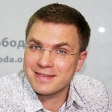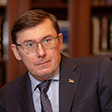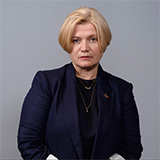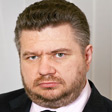Dear Facebook
A brief review of history
In March 2014, following events of the Maidan "Revolution of dignity", the Russian Federation occupied the Autonomous Republic of Crimea – part of the territory of a sovereign European state, Ukraine.
The Kremlin went on to inspire a large-scale military conflict in the south-east Donbas region of Ukraine that to date has claimed more than 7,000 lives and caused million of citizens to be uprooted and face an uncertain future.
The violence and chaos in the region led to the tragic death of 298 passengers of Malaysian Airlines MH17 when it was hit by a Russian "Buk" anti-aircraft missile system.
The United States of America and the European Union have together unequivocally condemned the Russian Federation government of President Vladimir Putin and his aggressive policies towards Crimea and eastern Ukraine.
Russia's occupation of Crimea and its continued military operationsin Donbas have been recognized by the United Nations as a gross violation of the principles of the international law and the peaceful coexistence of nation states.
The importance of social media
Faced with such historic aggression, many Ukrainian citizens resisted though peaceful methods such as raising international awareness via social media.
Facebook became one of the most effective public platforms to counteract the actions and the propaganda of our aggressors. Bringing the truth to the world about the events taking place in Crimea and eastern Ukraine by means of Facebook's social network was an invaluable tool for Ukraine's freedom.
Social media volunteers used Facebook posts and groups to increase public awareness of Russian military presence in Ukraine – the "little green men" – and human rights violations and to focus international attention on the actions of the Russian Government.
A worrying pattern emerges
But recently we have become "deeply concerned" by the behavior of Facebook, which – whether intentionally or not – is enabling often fake Russian accounts or "bots" to spread mistruths and limiting real Ukrainian voices from their free speech.
The recent and unjustified blocking of popular and peaceful Ukrainian users and the enabling of mass attacks by Russian "bot" accounts against Ukrainian users, has turned Facebook into a potent and biased information weapon against Ukraine.
There are many worrying examples.
Recently a group of Ukrainian social media users posted a new meme "что там у хохлов" (what's up in Ukraine). It was a positive and non-offensive post, but Facebook, without delving into the specifics of the slang, unreasonably blocked it basing on a false complaint.
Facebook (perhaps via its Russian offices) has also blocked Ukrainian Facebook users such as the well-known Ukrainian poet Andrii Bondar, the chairman of Luhansk Regional State Administration Genadii Moskal, and the popular Parliamentarian Borys Filatov.
Some of them are blocked seemingly forever.
We believe these personal bans of popular Ukrainian Facebook accounts have been caused by bogus and organised Russian "bot" complaints – part of Russia's information war – and by Facebook's Russian office bias.
Such actions have an affect of delegitimizing well-known Ukrainian Facebook users and assisting Russia's propaganda war.
Turns out Russia is abusingthe system
Banning videos on Facebook usually takes place in the early days of their placement. One method is by sending a complaint to Facebook to raise the minimum age of the viewer to 18 years.
Russian State "online bots" abuse this system in a targeted process by requesting Facebook block virtually any post, picture, or video from a well-known Ukrainian social media user and by accusing their authors of unreasonable violations.
This coordinated practice has had a significant impact on Ukrainian democracy and freedom of speech because it has led to the mass blocking/banning of popular Ukrainian users who actively shape global public opinion through large audiences subscribed to their accounts.
Ukrainian users have few tools to appeal and Facebook has no offices in Ukraine. Facebook's Moscow office responds to unjustified blocking of Russian users. Here is a recent example. Serving as the main representative office in the region, the Moscow office ignores similar appeals filed by Ukrainians.
The insufficient representation of Facebook in Ukraine has created an imbalance of representation, taken away free speech from Ukrainians and boosted Russian State coordinated propaganda efforts.
So, what now needs to be done?
Ukraine is under sustained attack from Russian political strategists and intelligence agencies. Information attacks initiated and guided by Russia State actors are part of a new type of "hybrid" high-tech war, which can be difficult to identify and counteract.
Citizens must be protected from such attacks and in order to protect freedom of speech in Ukraine and to meet the provisions of the UN General Assembly resolution dated 27 March 2014 "On territorial integrity of Ukraine" (A/Res/68/262), the Ministry of Information Policy of Ukraine serving as a central executive body ensuring information sovereignty of Ukraine hereby formerly appeals to Facebook to investigate the above facts and circumstances and to take all necessary measures to ensure the right to use social networks to promote full and accurate information about the tragic events taking place in Ukraine due to Russian aggression.
The Ukrainian government is concerned that reputable and popular Internet resources such as Facebook should not serve as tools for sophisticated information operations conducted by Russian State intelligence agencies and aimed at systematically manipulating and undermining social media for the incitement of war, hatred, and the destabilization of the situation in our country.
We seek an urgent review of Facebook's banning policy of posts and people in Ukraine by its leadership and increased expert staffing to deal with systematic abuse of the system by Russian State "online bots".
Finally, we kindly ask you to open a Facebook office in Ukraine demonstrating the openness of your company and your commitment to the principles of democracy and multiculturalism in the region and the promotion of European values of free speech.
Блог автора – матеріал, який відображає винятково точку зору автора. Текст блогу не претендує на об'єктивність та всебічність висвітлення теми, яка у ньому піднімається. Редакція "Української правди" не відповідає за достовірність та тлумачення наведеної інформації і виконує винятково роль носія. Точка зору редакції УП може не збігатися з точкою зору автора блогу.







